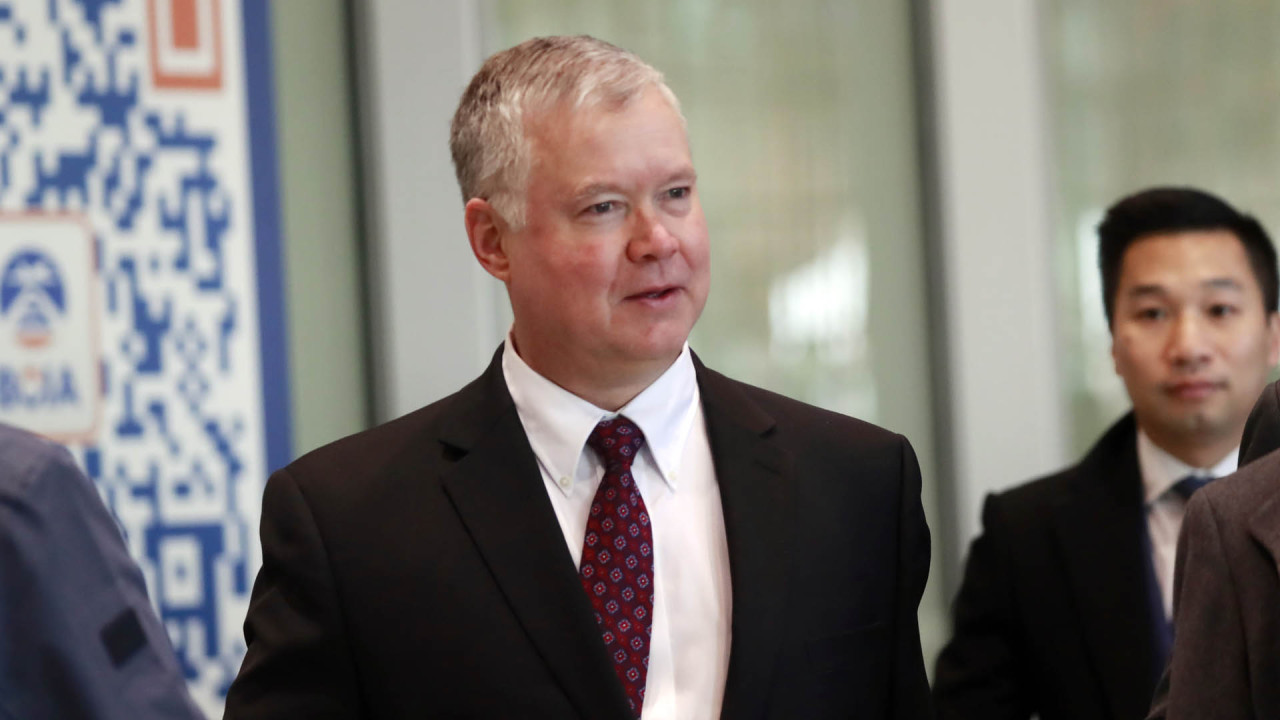 |
US Deputy Secretary of State Stephen Biegun (Yonhap) |
The US Deputy Secretary of State Stephen Biegun is expected to focus on the stalled denuclearization process on North Korea during his three-day visit here. But the North said it has no intention to resume dialogue with the US.
In a statement released through the North’s official Korean Central News Agency on Tuesday, hours before the US envoy arrived in Seoul, senior North Korean Foreign Ministry official Kwon Jong-gun said Pyongyang has “no intention to sit face-to-face” with Washington, and urged South Korea to “stop meddling.”
Biegun, who doubles as the US’ chief nuclear envoy, arrived on a military plane at the US Osan Air Base in Pyeongtaek, Gyeonggi Province, on Tuesday afternoon. He is set to head to Japan on Thursday to meet with officials and return to the US on Friday.
On Wednesday, Biegun is set to meet with Foreign Minister Kang Kyung-wha and First Vice Foreign Minister Cho Sei-young. He is also holding talks with Lee Do-hoon, Seoul’s top nuclear envoy, on ways to bring North Korea back to the negotiating table for denuclearization. Biegun could meet with Seoul’s new national security adviser Suh Hoon at Cheong Wa Dae.
The US Department of State said Biegun’s trip to Seoul and Tokyo is to “continue close allied cooperation” on a range of bilateral and global issues, including the “final, fully verified denuclearization of the DPRK,” in reference to North Korea’s full, formal name.
The trip of US President Donald Trump’s point man on North Korea arrives as US-North Korea talks have been at a standstill since last year. Biegun last visited Seoul in December, during which he urged North Korea to restart denuclearization talks.
Trump and North Korean leader Kim Jong-un have met three times, beginning with their first summit in Singapore in 2018, raising hopes for an end to Pyongyang’s nuclear program. But the negotiations have stalled since their second summit in February last year in Vietnam as two sides failed to narrow differences over the extent of sanctions relief that should be provided in exchange for the North giving up its nuclear capability. The subsequent working-level meeting has also fallen apart.
Biegun said last week that there still remains time for the two sides to make “substantial progress.” But he said it is unlikely for an in-person summit to happen before the US presidential election on Nov. 3, due to the COVID-19 pandemic.
Prospects of a new summit gained traction after South Korean President Moon Jae-in floated the idea last week that he would work to facilitate one before the US election. John Bolton, Trump’s former national security adviser, also told reporters that Trump might seek another summit with Kim as an “October surprise” before the election.
North Korean First Vice Foreign Minister Choe Son-hui, however, ruled out such a possibility on Saturday, saying Pyongyang does not feel “any need to sit face-to-face with the US.”
Choe accused the US of considering “dialogue as nothing more than a tool for grappling with its political crisis,” adding that the North has already established a “detailed strategic timetable” for managing the “long-term threat from the US.”
“Is it possible to hold dialogue or have any dealings with the US, which persists in the hostile policy toward the DPRK in disregard of the agreement already made at the past summit?” she posed.
Pyongyang in recent months has also been ratcheting up tension against Seoul, demolishing an inter-Korean liaison office and threatening to scrap a bilateral military agreement, in protest against defectors sending anti-North Korea leaflets across the border.
By Ahn Sung-mi (
sahn@heraldcorp.com)







![[Today’s K-pop] Blackpink’s Jennie, Lisa invited to Coachella as solo acts](http://res.heraldm.com/phpwas/restmb_idxmake.php?idx=644&simg=/content/image/2024/11/21/20241121050099_0.jpg)
